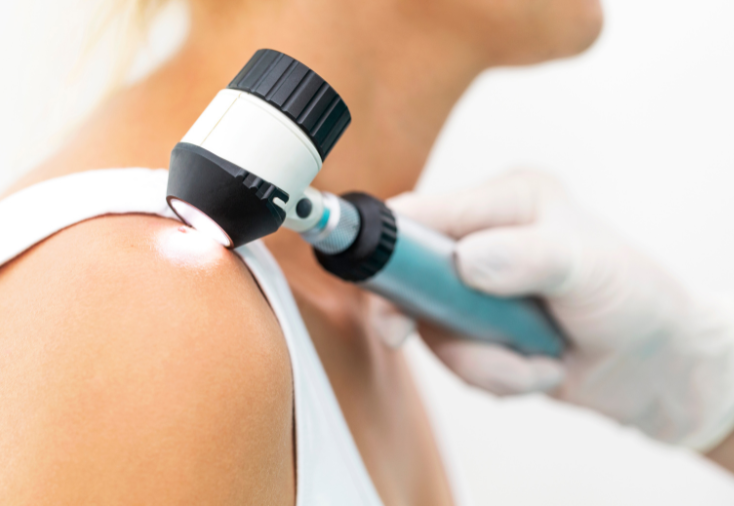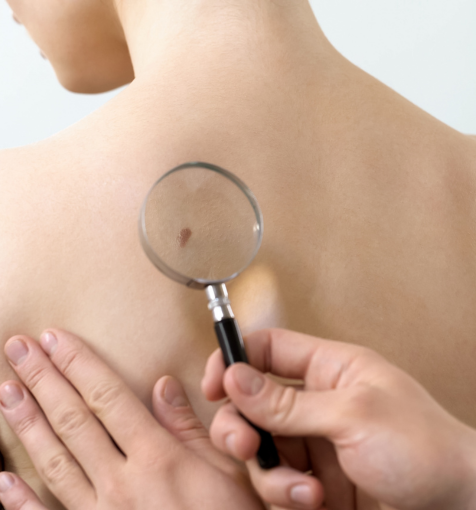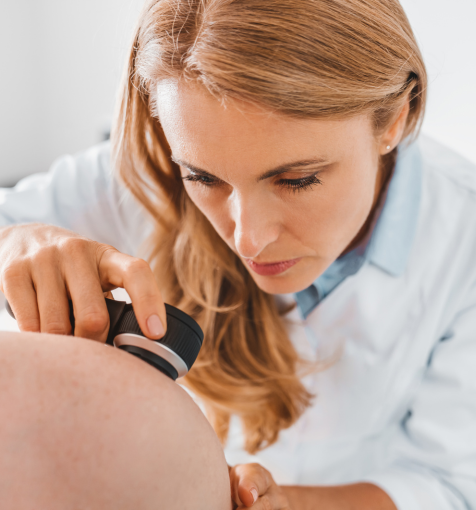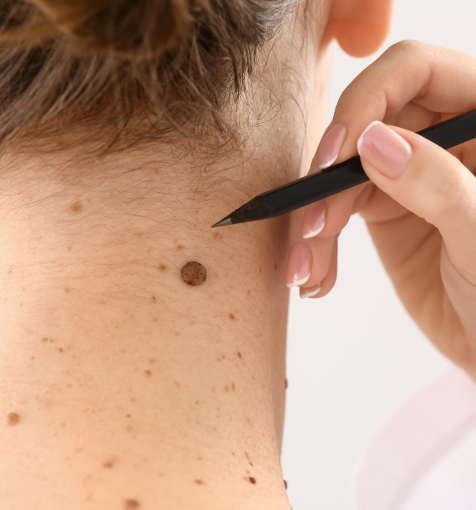Learn How to Prevent, Identify, and Treat Skin Cancer in New Jersey
Skin cancer is the most common form of cancer in the United States, affecting approximately one in five Americans over the course of their lifetime. Early detection is critical, as most types of skin cancer are highly treatable when caught promptly. At Skin & Laser Center of NJ, our board-certified dermatologists provide comprehensive skin cancer care, guiding patients through every step—from initial evaluation and diagnosis to personalized treatment plans and ongoing prevention strategies.


Skin cancer develops when the DNA in skin cells is damaged, often due to excessive exposure to ultraviolet (UV) radiation from the sun or tanning beds. This damage can cause cells to grow uncontrollably, forming malignant tumors. Key risk factors for skin cancer include:
Prolonged or frequent sun exposure without protection
Fair skin, light hair, and light-colored eyes
A history of sunburns, especially in childhood
Family history or genetic predisposition
Immunosuppression from medications or medical conditions
Awareness of these factors is essential for early detection and prevention. Regular self-exams and professional skin checks allow our dermatologists to identify suspicious lesions before they develop into more serious conditions.
Skin cancer encompasses several distinct types, each with unique characteristics:
Basal Cell Carcinoma (BCC): The most common type, often appearing as pearly or waxy bumps, typically slow-growing and rarely metastasizes.
Squamous Cell Carcinoma (SCC): Can appear as firm, red nodules or scaly patches, with a higher risk of spreading if untreated.
Melanoma: A more aggressive form that develops in pigment-producing cells; often appears as a dark, irregular mole or lesion and can spread quickly if not treated.
Other rare types: Include Merkel cell carcinoma and cutaneous lymphoma, which require specialized care.
Understanding the visual and behavioral differences between these cancers allows patients and providers to act quickly, improving outcomes and reducing the risk of complications.


Preventing and treating skin cancer requires a combination of proactive measures and expert medical care:
Prevention: Daily use of broad-spectrum sunscreen, protective clothing, and avoiding peak sun hours can significantly reduce the risk of developing skin cancer.
Early detection: Routine self-checks and professional skin exams help identify suspicious lesions early, when treatment is most effective.
Treatment options: Depending on the type, size, and location of the cancer, treatments may include:
Surgical procedures such as Mohs surgery or excision
Topical medications for early-stage lesions
Laser or light-based therapies
Follow-up monitoring to prevent recurrence
At Skin & Laser Center of NJ, our dermatologists design individualized treatment plans that prioritize both the complete removal of cancerous tissue and the cosmetic appearance of the skin. Our goal is to restore your health while maintaining confidence in your skin’s appearance.
Expert Guidance for Skin Cancer Awareness and Care
There are several different kinds of skin cancer that we treat at our New Jersey-based practice, but the most commonly occurring types are basal cell carcinoma, squamous cell carcinoma, and melanoma. Other types of skin cancer that New Jersey patients might experience include dermatofibrosarcoma protuberans, merkel cell carcinoma, and sebaceous carcinoma.
Of the various types of skin cancer, basal cell carcinoma is by far the most common, accounting for about 80 percent of skin cancer cases. Basal cell carcinoma develops in the basal cells, which are responsible for creating new cells after old skin cells die. This particular type of cancer is most likely to occur in areas that are commonly exposed to sunlight, such as the head, face, neck, and hands. However, this does not preclude basal cell carcinoma from forming on other areas of the body. This tends to occur after years of sun exposure or indoor tanning and often presents as a round, flesh-colored growth.
The second most commonly occurring form is squamous cell carcinoma, developing in the outer layers of skin in areas frequently exposed to sunlight. This cancer tends to manifest as firm red bumps and scaly patches. While this is most likely to occur on the ears, face, neck, arms, chest, and back, it can occur on other parts of the body as well.
The third and potentially dangerous form is melanoma. This appears in cells that are responsible for creating pigment in the skin, and it is considered dangerous because it can grow quickly and is capable of spreading to the lymph nodes and internal organs. Melanoma can appear within an existing mole or as a new dark spot in the skin. As with all skin cancers, early detection and treatment has a high rate of success.
Skin & Laser Center of NJ offers a variety of highly effective skin cancer treatment options. The first step to pursuing skin cancer screening in New Jersey is to schedule a consultation with one of our experienced providers. They will conduct an examination to check for moles, birthmarks, or other pigmented areas that could be indicative of cancerous cells. If your provider identifies a problematic area, they may conduct a biopsy to test for cancer, and then discuss treatment options.
The goal of any skin cancer treatment is to remove all cancerous cells. Depending on the size and location of the lesion and general health of the patient, this can be accomplished through a variety of methods. The most common are:
As Benjamin Franklin famously said, “An ounce of prevention is worth a pound of cure.” While not all skin cancer is preventable, there are steps you can take to mitigate your risks. The most important thing you can do to help avoid skin cancer is staying out of the sun and covering any exposed skin when it is impossible to avoid direct sunlight. Long sleeves, hats, and sunglasses are excellent tools in this endeavor. Be sure to use sunscreen with a high SPF, even if the weather outside is cloudy. Avoid indoor tanning machines. Be sure to conduct regular screenings at home to look for new moles or changes in existing moles following the A, B, C, D, E guidelines outlined above. And, of course, if you have any questions or concerns, the providers at Skin & Laser Center of NJ are here to help.
Convenient walk in hours available below. No appointment needed! Accepting private insurance and medicare. No medicaid plans.
Learn more about medical treatments at New Jersey’s Skin & Laser Center of NJ. Call 201-500-7525 or contact us online to schedule a consultation.